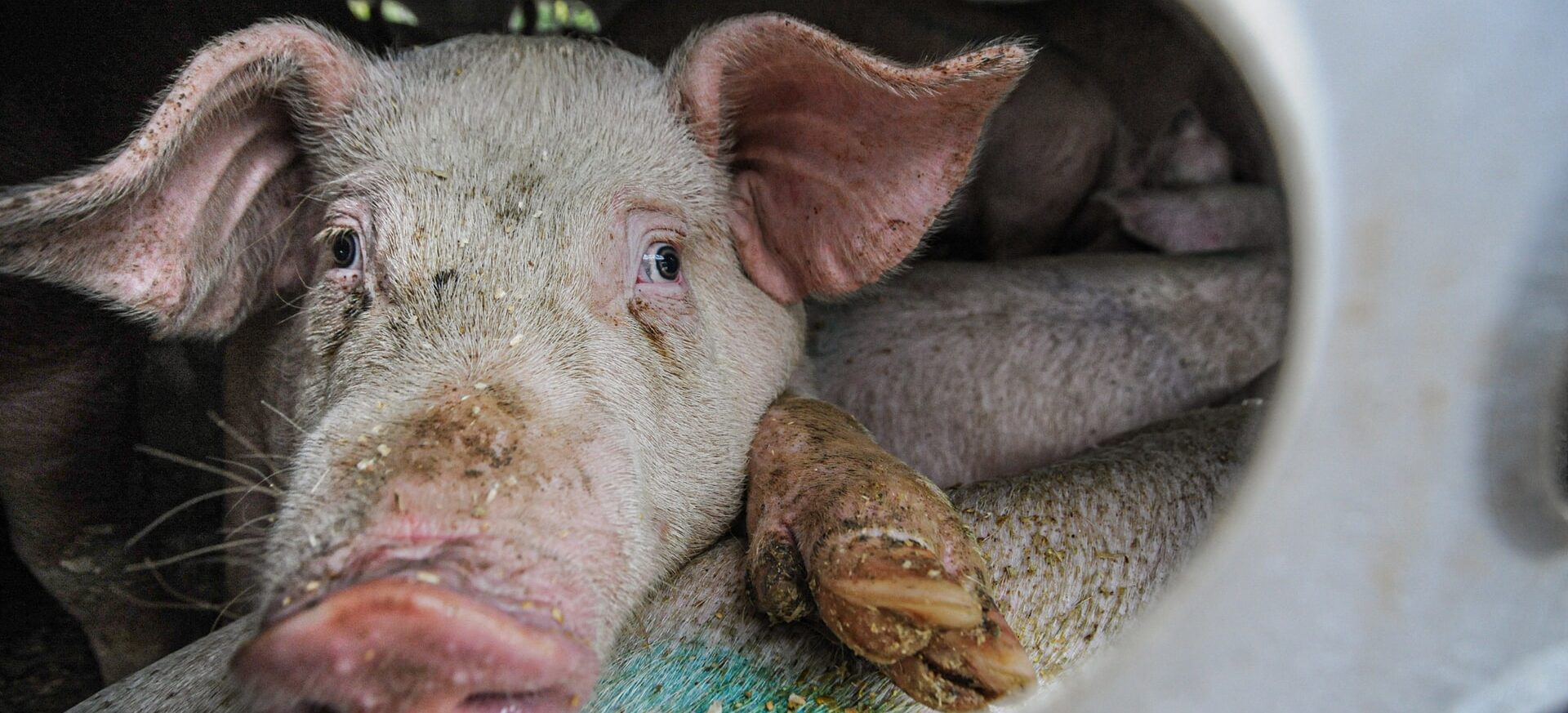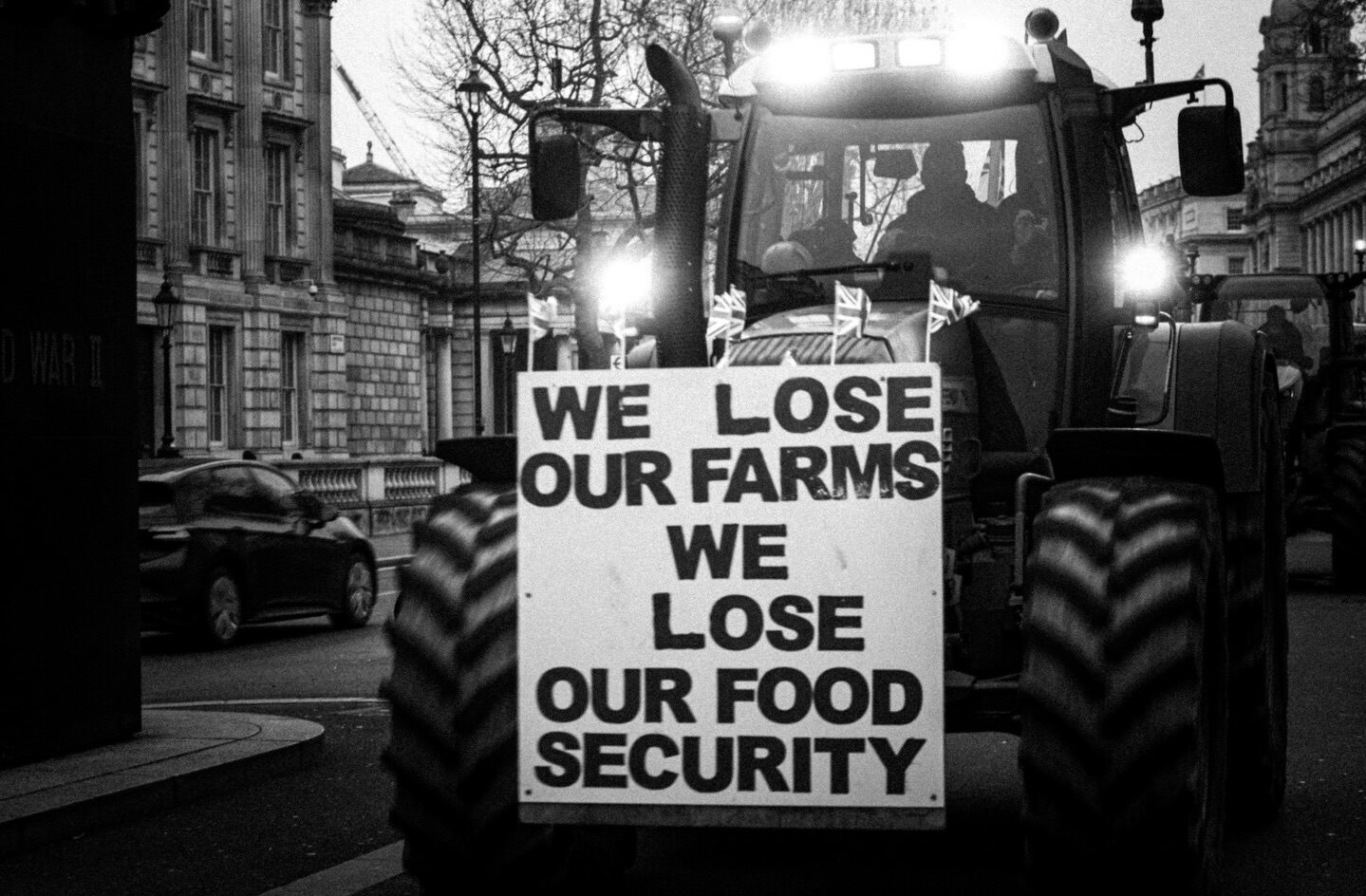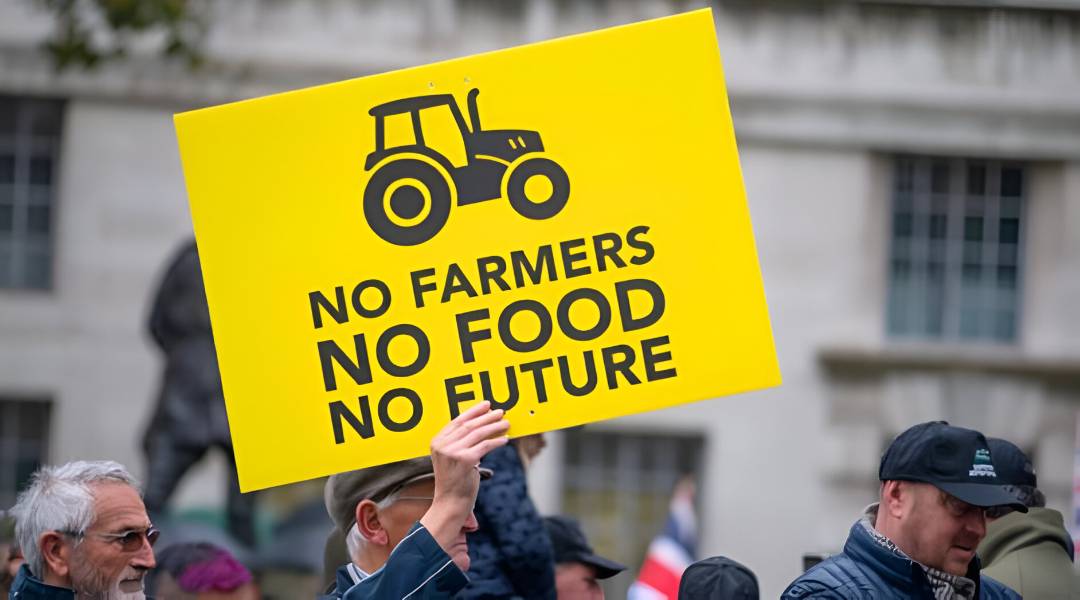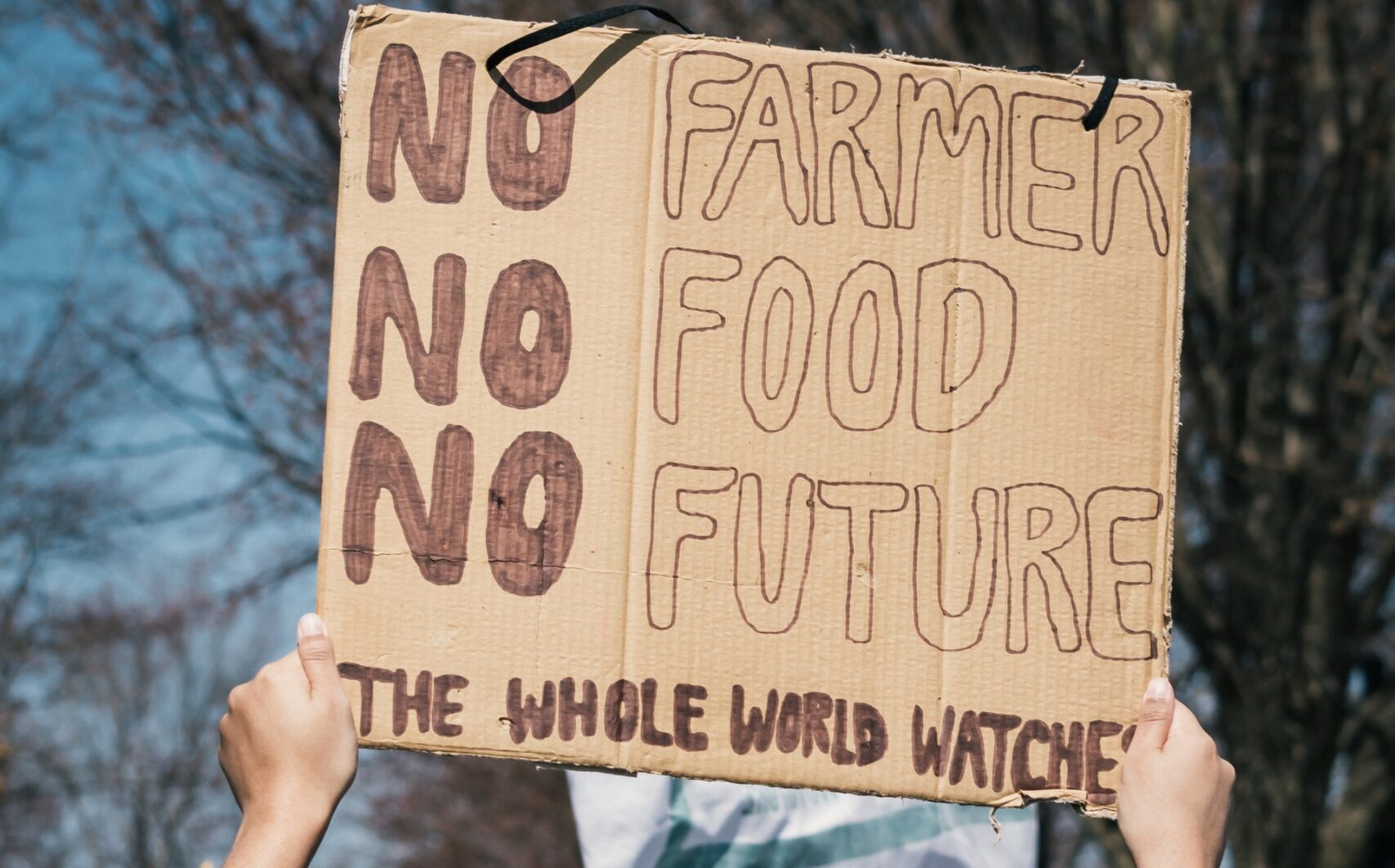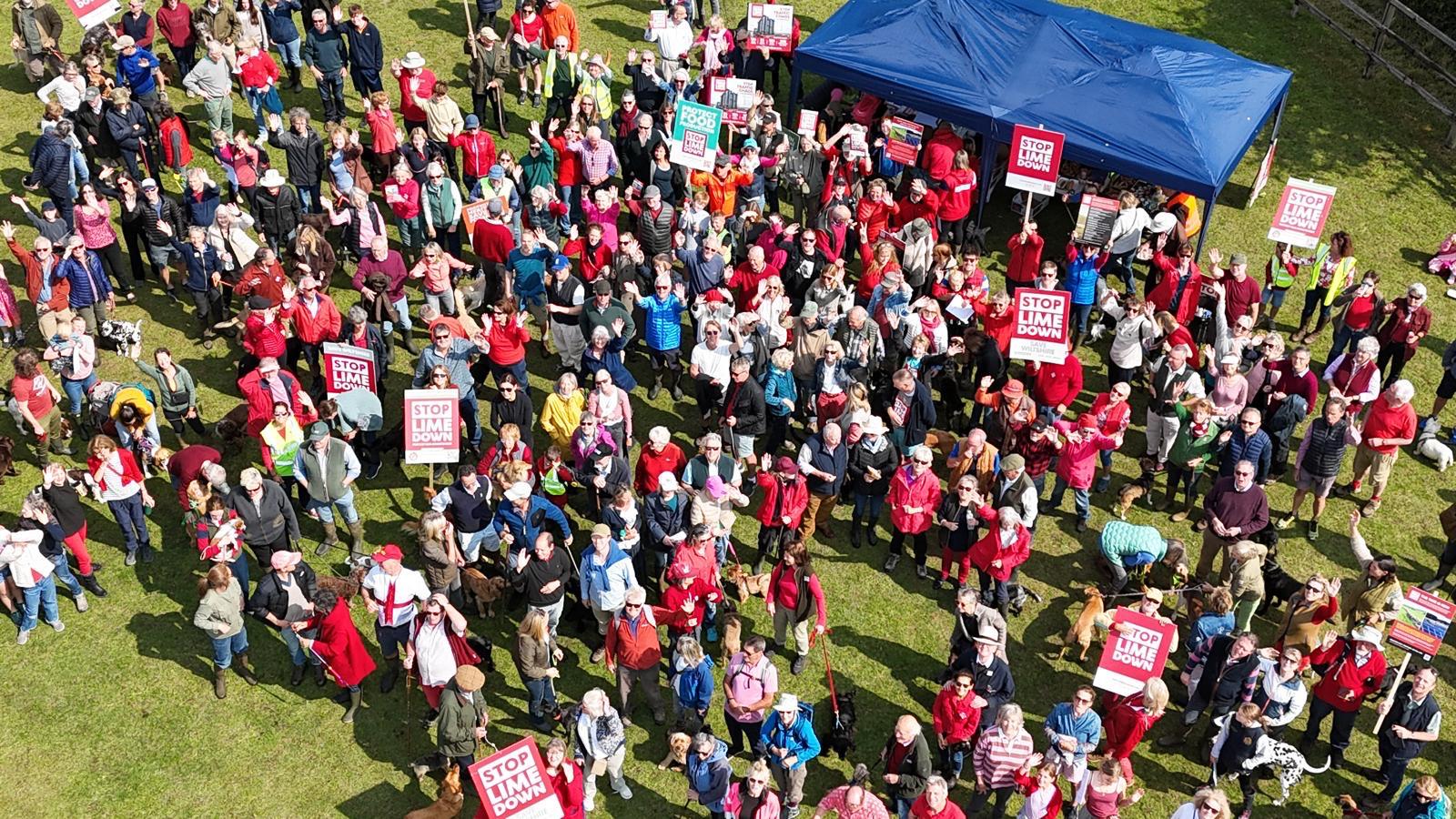? A Pig’s Life – Farrowing Crates
In factory farms, while feeding their piglets, mother pigs are crushed into steel cages (farrowing crates) for 5 weeks at a time (up to 2.5 months/year). Unbelievably these are still legal in the UK, while they have been banned in Germany, Sweden, Finland, Norway and Switzerland and in some states in the USA. Stop this torture by only buying RSPCA Assured, Free Range or Organic. Spread the extra cost by eating less, but better meat – or going meat-free.
Our Pig lives are a sad story
As we pigs were raised in a factory
Not on a family farm
Here the workers do us unspeakable harm
Mother is in an awful state
She is caged in a farrowing crate
For 5 weeks she can’t change her position
We babies then live in miserable conditions
In overcrowded dark dank cells
Cramped in in like Hell
Not only will we pigs never play
We factory pigs will never see the light of day
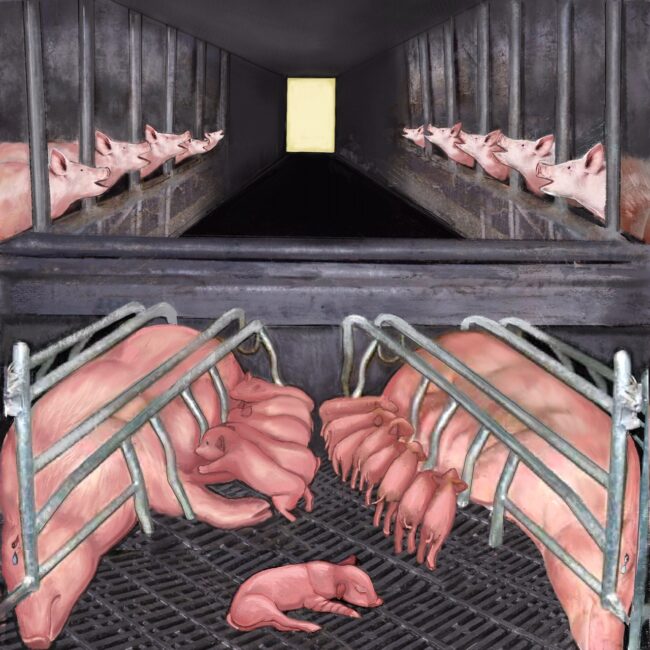
? #TurnYourNoseUp at factory farming
While cooking an amazing Sichuan snack dish using fresh, organic and ethically sourced ingredients, TV chef and food writer, Ching-He Huang MBE, says #TurnYourNoseUp at factory farming. She fuses tradition and innovation – making Chinese cooking accessible, healthy and nutritious. You may recognise her from TV programmes such as ‘Exploring China: A Culinary Adventure’ with chef Ken Hom. If you know any chefs who only serve high welfare pork and who might be interested in promoting their restaurant/take away by making a short video, we are always happy to promote them.
? 100,000 pigs
If all chefs, public and private food bodies and the public followed her lead by only sourcing their food from high welfare UK farms, our food economy would be far less susceptible to the vagaries of global markets. Last week we told you about the red tape affecting the UK pig trade, where pork was reported to be rotting in containers due to delays at customs. We now hear in the FT that the UK pig industry has asked the government for help after further Brexit-related border problems and an influx of cheap European meat after China banned pork imports from Germany due to African Swine Fever outbreaks in the wild boar population. As a result more than 100,000 UK pigs are backed up on farms around the country.
So, the UK pork industry is asking for government support by prioritising the sale of UK pork and the sale of less popular cuts. This common sense approach of protecting local farm economies has been crushed by the dominant neoliberal narrative promoted by excessively powerful multinational companies who comb the globe for the cheapest lowest possible food safety, animal welfare and environmental standards to out compete SMEs (small and medium-sized enterprises) the world over.
Our weekly series of videos of small scale high welfare pig farmers, their local traditional humane slaughterhouses, local butchers and shops, shows how much more resilient they are to market shocks. The centralised, consolidated food system with lengthy food miles has needed government subsidies during supply chain shocks like COVID illnesses and lockdowns. Dairy and beef farmers in N Ireland, for example, received a £25m Covid aid fund and pig farmers in N Ireland who were financially hit last year by the temporary closure of the Cranswick meat plant at Ballymena were offered a share of a support package worth £2.2m because of an outbreak of coronavirus among its workforce. The pig processing plant processes about 10,000 animals each week, so the closure led to significant losses among an estimated 130 local pig producers.
We must wake up to the resilience of local markets as recommended by the UN Food and Agriculture Organisation.
? Demonstrations in India
To prevent this corporate takeover of SMEs in India, millions of farmers and farmworkers are calling for the repeal of three agricultural laws that they see as erasing government protections for farmers while benefiting corporations. The protesters believe the new market-friendly laws will get rid of the government’s minimum support price guarantee, which ensures farmers a base level of profit from selling their produce.
The Landworkers Alliance asks you to write to your MP explaining how ‘in India the impact of the proposed Agriculture Bill on farmers will be particularly acute. India is a nation of highly productive small farmers with over 120 million farmers & 140 million agricultural workers/labourers comprising nearly a third of the total rural population and 50% of the national workforce. Many Indian states have strong powers to provide a guaranteed minimum price to farmers, which provides a fair livelihood for them and the agricultural workers they hire, alongside ensuring basic food security for India. Removal of these protections will have a direct impact on the livelihoods of these millions of farmers and farmworkers in India.’
The UK is implicit in promoting market reforms and providing expertise to the Indian government to allow private investment and increase corporate control of the agriculture sector in India. So, campaigners are asking our MPs to act now to support India’s farmers in two ways:
- Revise the UK approach to aid to India, including the Conceptual Framework on Agriculture and the UK-India Infrastructure Technical Co-Operation Facility (ITCF), which promotes contract farming (one of the issues the farmers are protesting about) and finances consultants to ‘alleviate bottlenecks to private sector investment in agriculture’ in India.
- Stop exports of pesticides banned in the UK to India and other countries, including Paraquat, which is responsible for thousands of farmer deaths in India – a situation so severe that doctors in India have resorted to hunger strikes demanding a ban on its usage.

? GMO ban in Mexico
While India’s president Modi is following the neoliberal agenda prescribed by his corporate funders, not least Bill Gates, Mexico’s President Andrés Manuel López Obrador (AMLO) is countering it, by protecting his farmers, citizens health and biodiversity by announcing a fade out and ban of glyphosate and GMO corn. As the Greenpeace article explains;
‘The presidential decree published on the last day of 2020, bans the use of the herbicide glyphosate in all federal government programs and establishes the progressive elimination of its use, acquisition, distribution, promotion and importation, as well as the prohibition of agrochemicals containing glyphosate, to achieve full eradication by 2024. Nor does the decree allow the planting of transgenic corn, emphasising that authorisations for the use of genetically modified corn grain in the diet of Mexican people will not be granted, until replaced completely by sustainable and culturally appropriate alternatives, to be no later than 31 January 2024. This translates as a great victory for the health of people and the environment.’
? Big corporate plant based protein
As lab-grown meat makes its way onto the menu we should be aware of the marketing and corporate agenda behind it. Wealthy corporations have limitless funds to buy the propaganda to manufacture consent for lab meat to become the alternative to factory farmed meat. However, as it stands FNF advocates for people to eat less but better ‘real’ meat, and choose plant and fungi based meat substitutes rather than meat grown from animal muscle cells in a lab. Please beware of the false rumours that organic meat is just as bad for the environment as conventionally farmed meat.
Of course lab meat is a step in the right direction for those citizens who trust the corporations who own, control and profit from this technology and intellectual property. We will see how popular it is since in December Singapore, became the first country to approve lab-grown meat.
This excellent opinion piece talks about whether alt-meat venturists are out to save the world, or just turn a profit, and that this business’s current ‘affinity for and resemblance to agribusiness will ultimately prolong the hegemony of animal slaughter, not challenge it…Mimicking the meat giants, aspiring to their mammoth production and monopolistic tyranny, is to build a “new” industry in the image of the world’s ugliest business.’
? Cargill; America’s second largest corporation
Cargill is one of these behemoth companies that is investing in lab-grown meat and protein alternatives; whether the investment is to ultimately close the inconvenient competition against livestock production, packing and feed or to jump on lab meat’s success, Greenpeace’s investigative journalists expose this company’s control of our food system.
“Cargill has built the modern agriculture system – with all its abuses… With soya, for instance, Cargill might buy beans from Brazilian farmers, store them in a Cargill silo, take them across the ocean in a Cargill-leased ship to a Cargill feed mill, then truck the resulting animal feed to a Cargill-contracted chicken farm.”
The Cargill family, 14 of whom are billionaires, still own 88% of the corporation, giving the company a powerful cloak of invisibility; it’s almost entirely up to Cargill how much it chooses to share with the public and, despite their complicity in environmental destruction, child labour scandal, deforestation and fatal food poisoning, they still claim that they are “nourishing the world”. There is nothing much people can do when companies miss their Social Corporate Responsibility (SCR) targets, like Cargill has done when it comes to the environment; last year it admitted it would miss its deadline to end its complicity in deforestation so it has adopted a target of 2030. People on the ground in Brazil say that there is little sign of any such changes being enacted.
Not surprising when both US Republicans and Democrats elect corporate stooges like Tom Vilsack to be their Agriculture Secretary. ‘Pulling Tom Vilsack directly from the dairy lobby to the agency meant to regulate that industry would be disastrous for the climate,’ Jennifer Molidor, senior food campaigner for the Center for Biological Diversity, wrote to Sierra. ‘The US needs a secure, just, and climate-friendly food system, not an agency chief who will continue business-as-usual while the climate crisis grows.’ Not forgetting the myriad of other dangers to human health and biodiversity associated with industrial agriculture.
? Zoonotic disease prevention
The growth in plant or lab-grown meat may not have curbed the growth of factory farms, but it has generated a plethora of promises to clean up their act. China has made announcements on how they plan to improve the containment and mitigation of zoonotic disease, but experts say “existing laws were already strong enough to have prevented both the Covid-19 pandemic and the Sars epidemic but that rules largely were not followed or enforced”.
?? A better life for UK pigs?
In the UK the AHDB (Agricultural and Horticultural Development Board) claims that ‘the vast majority of UK pig farms have good levels of welfare.’ However, their ‘Real Welfare‘ scheme is an industry-led survey of visible injuries to pigs, and not an assessment of adequate or even legal standards of welfare on the majority of UK pig farms. For instance 57% of UK pigs are illegally, routinely tail docked (compared to less than 5% in Sweden, Finland and Norway), and only 50% of UK growing pigs are kept on straw as the law, routinely ignored by vets, requires. If Red Tractor were to insist that accredited farmers comply with the new, legally binding DEFRA code for pig welfare, there would be fewer injuries, lower antibiotic use and greater consumer confidence. In a 2019 survey 82% respondents in the EU believed that the welfare of farmed animals should be better protected than it is now. The Soil Association is calling for intensive livestock facilities to be phased out as part of the UK’s post-Brexit transition to a more eco-friendly farming system.
“It is clear that there is gathering momentum for change in the way we farm,” said Rob Percival, head of policy at the Soil Association, which advocates only eating meat that has been sustainably produced.
The Welsh Government is leading the way on protecting their environment after 141 factory farm effluent pollution episodes in 2020 by bringing forward controls on nitrate pollution (BBC Farming Today 28 January, 3m30s). The whole of Wales will be designated as a Nitrate Vulnerable Zone and stricter rules on slurry spreading and fertiliser use will come into force in April this year.
☘️ Environment bill delay
The UK’s dismal record on protecting our pigs, people and planet, continues with the disappointing news that the UK government will, for the third time, delay ratifying the Environment Bill that was first introduced in July 2018. A recent UN poll (the biggest of its kind) reports that 66% of people polled in 50 countries consider climate change to be a global emergency, and in the UK, 81%. Overall, the most popular actions to tackle the climate crisis were protecting and restoring forests, followed by renewable energy and climate-friendly farming. The promotion of plant-based diets was the least popular of the 18 policies in the survey, with only 30% support. To increase these numbers we need to keep spreading the word about the true cost of factory farming and benefits of agro-ecology. The Eating Better campaign’s survey shows the UK audience is ready to reduce their meat consumption – 21% of people said they are eating less meat than a year ago and 9% now don’t eat any meat.
With COP26 just around the corner, and hosted by the UK, the environment should be taking high priority.
Friends of the Earth have published this advisory document on how to make the UK Environment Bill truly world leading with amendments made to what is being proposed so far. We will be keeping an eye on this as it develops.
Forgive me for pointing out that, while we receive some one-off donations, I am funding Farms Not Factories myself, and if we are to continue to fight the cruel, antibiotic-led factory farm system, we will need some regular donations from like-minded people. Please consider a monthly subscription of £2/month and help us support a network of smaller scale, humane and healthy UK pig farms, local abattoirs and butchers.
Contents
Share This Article
Related ArticlesView All
Protect UK Farmers from Low Standard Imports
The purpose of our newsletter is to give you important information that is censored in the mainstream media. “The way… Read More
Protectionism vs So-Called Free Trade
The purpose of our newsletter is to give you important information that is censored in the mainstream media. “The way… Read More
Find A Farmer
The purpose of our newsletter is to give you important information that is censored in the mainstream media. “The way… Read More
Zionist Money Rules
The purpose of our newsletter is to give you important information that is censored in the mainstream media. “The way… Read More
The Price of Progress
The purpose of my newsletter is to give you important information that is censored in the mainstream media. “The way… Read More
Silencing Dissent Through Fear
The purpose of my newsletter is to give you important information that is censored in the mainstream media. If you… Read More
